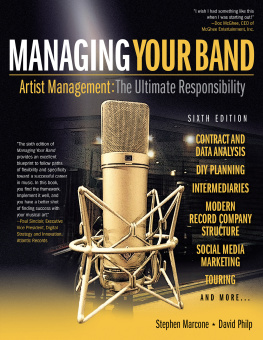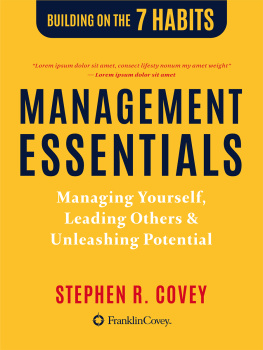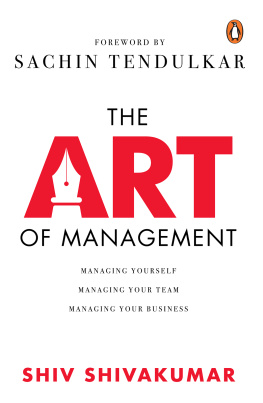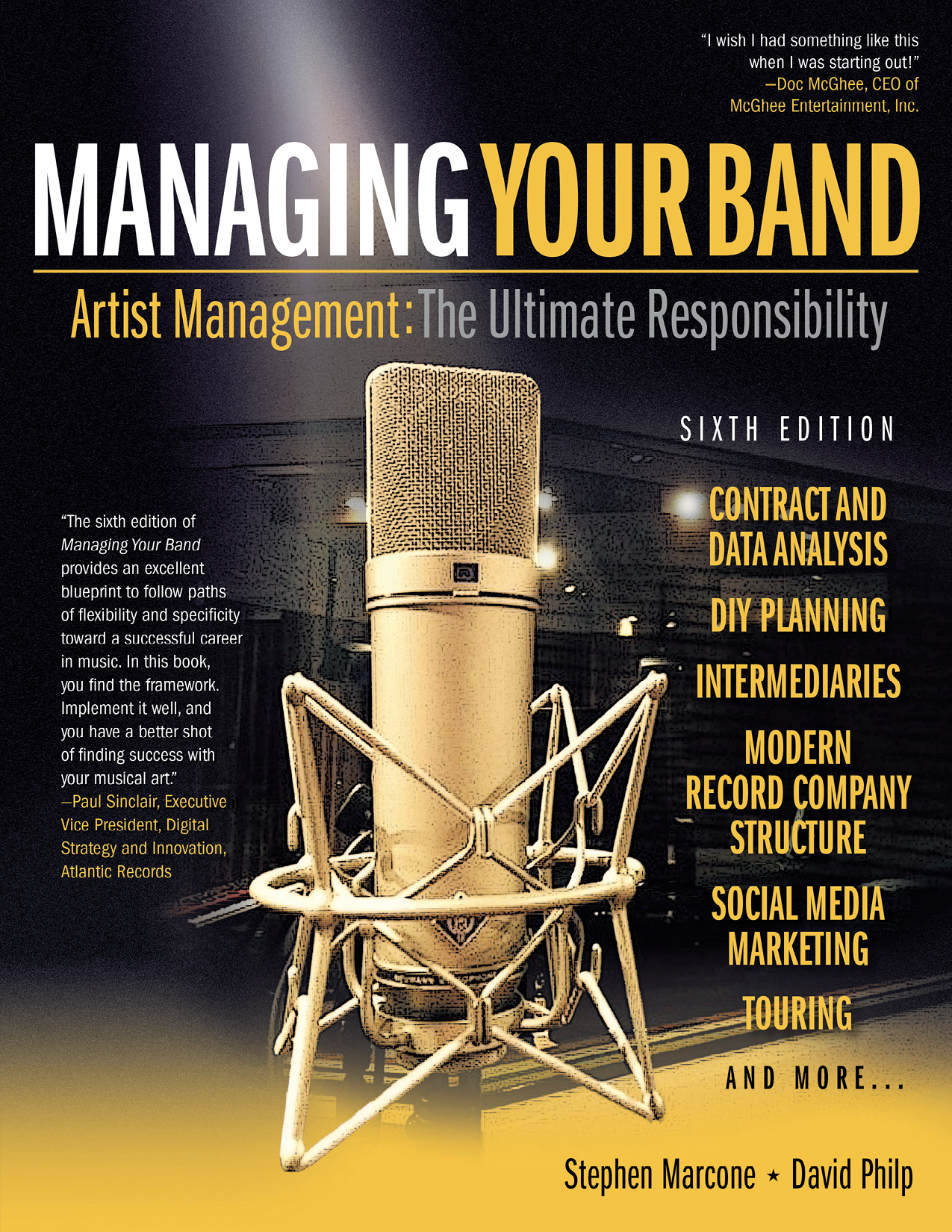Endorsements for Sixth edition
Managing Your Band , sixth edition, provides the foundation and the tools to build or even rebuild the essentials that none of us can afford to skate over in this competitive ever changing business of music.
ROB FUSARI, Grammywinning, multi-platinum record producer and songwriter
Managing Your Band is not a how to manual, but an honest, real-world take on how versatile a manager must be in todays fast-paced and ever-changing music landscape.
TOM HEFTER, Senior Marketing Services Specialist, National Tours, Ticketmaster
The only book I took to Israel to teach the Israelis about the international music and entertainment business.
HARVEY LEEDS, President, Headquarters Entertainment
For budding managers, this step-by-step guide will help you grow from a gear-lugging friend into a professional manager whose chops are equal to those of the bands you manage.
MICHAEL SIMON, President, Rumblefish
Not only a great resource, but also a great text for teaching about the managers role in securing success in this complicated business.
AARON VAN DUYNE, CPA/Business Manager
A concise and thorough book that brings clarity to complex and ambiguous facets in the contemporary music business. A must-have for all of my students.
DR. HAL WEARY, Lecturer in Music Business, Wayne State University
Copyright 2017 HiMarks Publishing Co.
Copyright for previous editions held by HiMarks Publishing Co. 1995, 1998, 2002, 2006, 2010
All rights reserved. No part of this book may be reproduced or utilized in any form or by any means, electronic or mechanical, including photocopying, recording, or by any information storage and retrieval
system, without permission in writing from the publisher.
Published in 2017 by HiMarks Publishing Co.
Distributed by Hal Leonard Books
An Imprint of Hal Leonard LLC
7777 West Bluemound Road
Milwaukee, WI 53213
Trade Book Division Editorial Offices
33 Plymouth Street, Montclair, NJ 07042
Printed in the United States of America
Book design by Kristina Rolander
Front cover design by Tilman Reitzle
Front cover photo by David Philp
ISBN 9780965125079
For information:
HiMarks Publishing Co.
P.O. 2083
Wayne, NJ 07474-2083
Contents
With barely a music graduate degree in hand, Stephen Marcone was given the opportunity to play in the big leagues. As a band that wrote and performed its own material, we somehow generated some interest at Epic Records to give us a chance and they signed us. The group was holding down a six nights a week, six sets a night summer gig at THE club in Lake George, New York and packing the place. We rehearsed almost every day and were probably as tight as any band could be. We sounded great and people paid to hear (and see) us. Things were happening pretty fast and it was exciting (and foreign) to the six of us.
As we began our first tour of arenas (as an opening act) we were told on numerous occasions to concentrate on the music and let them worry about the business. This was the fall after the summer of Woodstock 69, and it was obvious to many that there was now big money to be made from rock n roll. We had managementa friend of ours who could be trusted, a doctoral student at Syracuse University, who had been booking the band and had the intestinal fortitude to put up with us. He could swim, although we didnt know it, but not with the barracudas!
A short time later, while we were still in demand, we realized his shortcomings and decided to try another manager. We found one, or I should say, he found us, and had his attorney draw up an agreement. He came to us with experience, and we all liked him. After all, he was hipper than our friend, lived in NYC, and had gotten high with us on several occasions. What was not to like?
We received the contract that his attorney composed, read it, and were shocked that this guy, our newfound friend, would demand what was written on the pages. In fact, we were so appalled (and green), that instead of asking our attorney to respond with an equally outrageous counteroffer, we decided to run (not walk) back to our original manager/friend and ask his forgiveness.
Basically this is where the story ends. In fact, we committed industry mortal sin number two and went on to manage ourselves. After all, the Beatles did it (without success), so why couldnt we? Well, this is how I learned what not to do.
Only a few years later, I realized that many musicians are being shortchanged. For the most part, the players do not control the record business. (Arent baseball managers former players?) Possibly, with the right education and information, musicians could be in control of their own destinies. However, it would take time. Today the more successful musicians understand the business, make decisions, and some control their own careers, and own their own publishing and recording companies.
This book has been written to help the cause. Today, Personal Management is more important than ever, but is still the weakest link in a business that operates by fragmenting its product. That is, an artist must give (license) pieces of his/her product to several people that control different fragments of the business. Holding on to all of it doesnt work. ONE HUNDRED PERCENT OF NOTHING = NOTHING , no matter how you slice it. An artist must understand and learn to live within this concept. The trick is to give it to the right people for the shortest amount of time possible. I hope this edition helps artists and managers choose the right people to give it to, and the right people learn how to do it right!
The fifth edition was published in 2010. Prior to that the fourth was completed in 2006.
We are way overdue! This business has evolved into the ENTERTAINMENT business that encompasses the music business, the concert business, the licensing business, the festival business, the merch business, the fashion business, and the branding business. Consequently, personal management is as complicated and important as ever. Content is king and that also applies to creating a personal management guide to get one through the maze. So my colleague, Dave Philp, came aboard. We collaborated on what we hope is a very useful text for todays student of this ever-changing industry.
We decided to write this edition for two audiences: the personal manager, who has taken on the task of shepherding an artist from an unknown to stardom, and the DIY artist, who is aware of the need for having a team to succeed but is not in a financial position to hire the pros.
There are as many artists trying to make it today as ever. However, the industry has tightened up significantly, and many artists are either forced to make it on their own or realize that if their music isnt radio friendly, they can possibly make (keep) more money if they establish themselves as a business entity.
The budding personal manager should find this edition useful as well. The subject of marketing using social media is thoroughly discussed, including useful tools for potential success. The examples of modern recording contracts include 360-deal computation as well as standard clauses. Record companies are no longer just record companies. The Big Three have become modern entertainment companies, with departments that cater to the needs of multi-rights deals. We decided to take a look at all the functions the many industry intermediaries perform. Lastly, Chapter Eleven sort of wraps up the whole subject by illustrating how todays artist can function as his/her own entertainment company.















